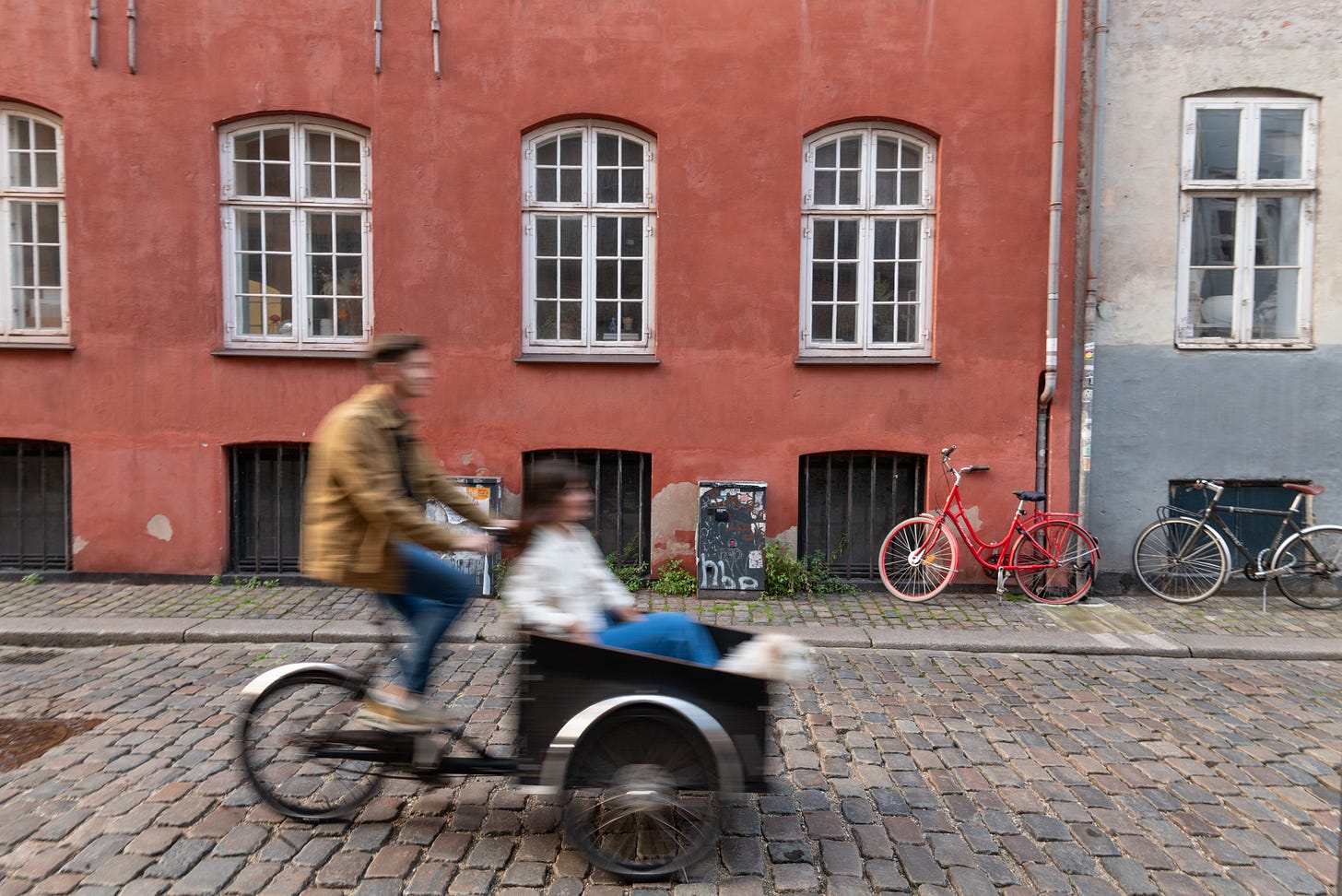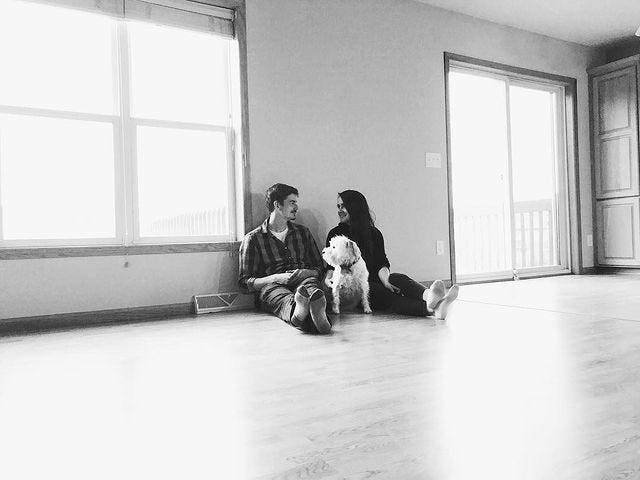5 Truths About Moving Abroad 🌍
The idea of escaping to Europe is romanticized by many Americans. Here's an honest look at 5 ways moving abroad isn't all it's cracked up to be.
In 2016 we did a lot of traveling. We kayaked and camped through the Exuma Cays (still one of my favorite trips to date), spent a month backpacking through Japan and Thailand, and then started 2017 off with a road trip through Germany and Austria.
When we got back to our (2200 sq. ft, 4 bedroom, 3 bath) home in the Suburbs of Madison, Wisconsin, we sorta looked at each other and said “What the f*ck are we doing?” We were 31, knew potential kids were still years off if at all, and we had the itch to do something different.
We toyed with the idea of “moving abroad for a bit”. We decided that the first step would be selling our home, and knew that regardless of whether or not we moved abroad, we no longer desired to be in a house that big. So first step, downsize. Then we’d see if any opportunities arose to move abroad.
Although we were originally open to landing anywhere initially — including staying in Madison — my partner made the decision to leave the job he’d been at for almost 6 years at a company he really loved and enjoyed, to see what opportunities existed. Since I was self-employed, he had a lot of flexibility in his job hunt and decided to cast a wide net to companies in other states. A few interviews later, and he landed a job with a small tech startup based in Copenhagen, Denmark, that had recently opened an office in Minneapolis.
So, by April, we had downsized our belongings substantially, loaded up what was left into a U-Haul, and relocated to the North Loop in Downtown Minneapolis. Waiting for us there was a new, 1100 sq. foot loft that opened up to Hennepin Avenue. If we were looking for change…we found it.
Moving abroad wasn’t a guarantee when he took the job. But we knew with an office in Copenhagen, there would at least be the opportunity for travel (to one of our favorite cities!). We were both surprised when the offer to relocate was on the table by December, and in April of 2018 — just over a year after deciding to uproot our lives — we were on a plane bound for Denmark with nine boxes, my road-bike, and our dog all securely loaded into cargo.
Originally the plan was to move abroad for one year. Which sounds so hilariously naïve looking back — but at the time we saw it as a way to introduce fun and spontaneity into our life without major commitments. Moving abroad for a year felt doable. I think it also made the “leaving” a little easier. It’s just 12 months! We’ll see you soon. Emotions = compartmentalized, you know?
But, surprise! It’s now been over 5 years, and we are still happily existing as Americans living in Denmark. We have no plans, currently, to return to the US, and would both cite our decision to move abroad as one of the best we’ve made.
But moving abroad is not all it’s cracked up to be. There are definitely things I didn’t realize the full gravity of when we set out on this adventure. There are, I think, also many things that felt romanticized to me as an American that are not so shiny once you arrive.
So, in the name of honesty and transparency, I am sharing 5 Truths About Moving Abroad, and I hope you’ll find them helpful and insightful, whether you’re planning to move abroad or have merely dreamed about it.
#1 The Allure of Universal Healthcare is A Mirage (if you’re American)
For many Americans, moving to a country that offers Universal Healthcare is *the dream*. If you are disabled or living with a chronic or terminal illness, moving to one of these countries can not only be *the dream* but it can literally provide you with the life-saving care that you should absolutely have access to regardless of where you live.
But something that isn’t talked about enough, is that moving to a country with Universal Healthcare will not magically solve all your health problems.
Because one of the biggest benefits of Universal Healthcare is that it’s universal. Meaning, everyone you know and love has access to it. Not only does this mean that the society you exist in is healthier, but it means that people living in these societies are generally absolved of the guilt and chronic stress of worrying about other people’s access to the care they need.
Not so if you’re an American.
You will still go to bed at night knowing that the vast majority of people you love and care about struggle to pay for simple things like insulin, hearing aids, or annual checkups. You’ll worry about your pregnant cousin and whether her high-risk pregnancy will bankrupt her family. You’ll still be invited to the GoFundMe’s for the local kid with leukemia and send items to silent auctions. You’ll wake up in a cold sweat thinking about Medicare and your aging parents.
While you will pay the *high tax rate* of benefiting from Universal Healthcare, you will never fully benefit from existing in a society where you and everyone you love are taken care of. You’ll worry, and it will be combined with the guilt you feel about having access to a simple human right that is denied to so many people you care about.
It’s a nice little fucked up medley of chronic stress and emotions that no one warns you about.
#2 No One’s Got Time For That
Depending on where you move, there’ll be a time difference. It won’t seem that significant at first. 6 hours, 7 hours, 8 hours…that’s nothing, really! And today? With ALL THIS TECHNOLOGY?! The world is so connected. I can see the people I love whenever I want. They’re a button away!
And that will all feel true…for a while. You’ll arrange many Zoom happy hours and Sunday afternoon calls and heck, maybe you’ll even watch entire movies online with your friends back home.
But eventually, the time difference starts to feel big. Really big. You’ll notice it in the amount of effort it takes to arrange a quick catch-up call. You’ll notice it in the way your friend’s posts end up buried by the algorithm. And eventually, by how disconnected you feel from events happening back home simply because you’re asleep when the bulk of American life is happening.
Don’t get me wrong, this issue is probably much more manageable now than it was even 20 years ago. And while the technology is incredible and I’m grateful for it…it does not eliminate the overall impact that living 7+ hours ahead of your community has on your life.
#3 Go Chase Your Wanderlust Dreams (wait, not so fast!)
You’re gonna move to Europe, and suddenly you are a 90-minute flight from Milan. It’ll cost you $40 to get to London. Portugal? $150!!!! And honey, you now have access to a minimum of 5 weeks paid vacation annually (and for many, it can be as much as 6-8 weeks).
Mmm, delicious. Fire up your laptop and start bookin’ those getaways.
But FIRST, think about any trips you need to make back home in the next twelve months and think about it long and hard.
Because the United States is one of the most expensive places to travel to. Flights will often teeter around $1000 or more, especially if you hope to be at home for the holidays.
Jet lag will inspire you to not go back for less than 10-14 days, eating up a solid chunk of that generous paid vacation.
And with little public transportation in most of the US, you might need to rent a car, which will add a significant expense to your trip planning. If your family and friends can’t accommodate you, be sure to factor in lodging costs, too (which are, in most places, also expensive AF).
It adds up fast, and isn’t unusual for our “quick” trips home to cost us upwards of $5,000-10,000+ depending on different variables.
We’ve been lucky that we are both able to work remotely when we travel home, so we haven’t had to “sacrifice” vacation time for trips home, generally, but it also kinda sucks to be working when you really just want to spend time with your family while scarfing down your mom’s chocolate chip cookies.
And if you think you’ll treat your trips home “like a vacation”, please reconsider. While it can sometimes feel like a bit of a holiday, it can be exhausting bouncing from place to place and living out of a suitcase while trying to see as many people as possible. The re-exposure to American culture can be overwhelming. Question and decision fatigue is at an all-time high. Grappling with how “different” you feel can cause a mild identity crisis. Add a bit of jet lag over the top of it. Your trips home might feel like a long, warm hug in the best possible way — but you’ll likely feel like you need an actual vacation afterward.
So before you move abroad with big dreams of extensive travel, think about what type of person you are. Will you want to visit home annually? Are there any big events in the next few years that will require you to be there more frequently than that? What does your budget for travel look like and will returning to the US be a financial strain, burden, or impossibility? How much vacation time will you have? Are you able to create an emergency fund in case you need to fly home for a medical emergency or death?
#4 You Thought Generational Wealth Was An Issue in America, Sweetie?
Generational wealth exists in the United States, a country that was only colonized like 400 years ago. Although some of that generational wealth came from Europe (“old money” as they’d say) plenty of American wealth is shiny, new, baby money.
And while generational wealth that is 400 years old is certainly SUMPTHIN, generational wealth that goes back thousands of years really feels like an entirely different flavor.
Europe, I think, does a better job of redistributing wealth and ensuring that even the poorest members of society are able to achieve a generally comfortable standard of living. But it can also feel like practically everyone you know has access to vacation homes in the south of France, summer homes at the seaside, and city center apartments that have been passed down through their family for generations.
And that can feel really overwhelming and discouraging.
ESPECIALLY when you are now an immigrant.
Any “wealth” you had accumulated in the US is now sorta being held ransom by a US bank and will incur fees and taxes the second you decide to move it over. You’ll encounter financial roadblocks such as not being allowed to purchase property without citizenship or needing to pay higher down payments due to your immigration status. If you aren’t the primary visa holder, you may not be allowed to open bank accounts or have your own credit cards. In many ways, it will often feel like you are financially starting over. Not only because you might quite literally need to build savings from $0, but you’ll also need to learn an entirely new financial system when it comes to pensions, investing, and everything else.
These types of financial obstacles can make it harder to reach the same financial benchmarks as your peers in the US. And, unless you brought generational wealth with you from the US, building generational wealth for your family in this new country? It’ll likely be harder than you thought.
As an example, let me explain rental costs. In Denmark, it’s not unusual to be required to pay 2-3 months rent PLUS a sizeable security deposit. I pulled the pricing for an apartment currently available for rent near us and converted it to USD.
The Monthly Rent is $2,782. But once you consider the advance payment, security deposit and prepaid rent it will cost you over $17,000 to move into the apartment. That is roughly 3-4 times what it would cost you in upfront costs to get into a similar apartment in the US. In Denmark, at least, it is also quite rare to get your security deposit back after renting.
This is worth knowing, because you’ll need to have a sizeable “nest egg” available upon your arrival, but don’t forget that money you transfer from the US will be met with fees and potential taxes, so you’ll need to account for that in your budgeting, too.
#5 The Anxiety Will Get Better…in 3-5 Years
Have you ever walked into some sort of social event and instantly felt like you didn’t belong? Maybe you didn’t realize there was a dress code or everyone is discussing last night’s episode of Game of Thrones and you’ve never seen it and suddenly you feel really uncomfortable?
Moving abroad can feel like that all the time.
In my experience, this ebbs and flows. There will be days or situations where the anxiety is a 10, and days where it is a 1. The thing that surprised me, was that it never really went away. It morphed into this subtle, constant hum of anxiety that became the soundtrack for my life.
It can make once-simple tasks like going to the grocery store, mailing a letter, or going to a networking event much harder than in your home country, and how disruptive this is to your life will largely depend on your personality and coping skills.
I’ve found that living abroad requires me to wake up every day being willing to make an ass of myself in public. Fortunately for me, that’s more or less my zone of genius, but if the idea of being uncomfortable in public makes you instantly break out in hives you might want to rethink a life abroad.
It’s not just that you don’t speak the language, or customs and protocols in public spaces are different from what you’re used to, those are things you can learn.
It’s that there is something deep within your heart, soul, and brain that knows you are away from your tribe. This made much more sense to me recently when I read the book “How Minds Change” by David McRaney which focuses on the neurology of how we form and change beliefs.
When we are receiving information in new environments, from people we perhaps don’t know very well, evolution puts our body in a defensive state. Historically, we couldn’t always trust people from other groups, and learning to be skeptical and critical is how we survived.
For me, it took a few years for this feeling to subside. Although I think if I’m honest, it’s still there, humming along at a low level in the background — I’ve just learned to accept it and understand it.
So, there ya have it! I could write pages chronicling all the things I love about living abroad. How it has changed me and enriched my life and how I wouldn’t trade this profound privilege and experience for anything — but the reality is that there are some really challenging and difficult aspects, too, and I wish I had been more aware of them in the beginning. I don’t think it would have changed my decision, but it might have made me feel less alone while working through them.
These “truths” are my own. I understand that not every person living abroad will encounter the same obstacles I have. Many of these struggles are dependent on the level of privilege you have, as well as the level of privilege of the people you left at home. Although my experience was not without difficulty, I recognize that my struggles seem quaint compared to those who flee their homeland due to war or disaster, or who immigrate with the additional burden of racism.
One of the things I’ve come to appreciate most about life as an immigrant is the honor of being part of the larger immigrant community and recognizing the role I can play in ensuring all immigrants are treated with respect and compassion regardless of where we come from.
💬 Are you living abroad? I’d love to hear anything you would add to this list or any experiences you’ve had with the things I mentioned! Have you thought about moving abroad and was this insightful for you? Happy to answer additional questions in the comments.











Related to this post very much. 🫶🏼 Have met a handful of Americans living in the UK, and what’s I’ve gathered is we all struggle at first, nearly convincing ourselves to move back to the US because of the constant questioning (forget everything you once knew, “you know nothing Jon Snow”). But then we go back to the states for a visit and BAM - reverse culture shock, and I hate it, and suddenly when the plane lands in England it’s a warm fuzzy feeling like you’re home again. Mind fuckery 🥲
This was great! We talk often about moving abroad, this gave me some things to think about that it hadn't occurred to me. Thank you!